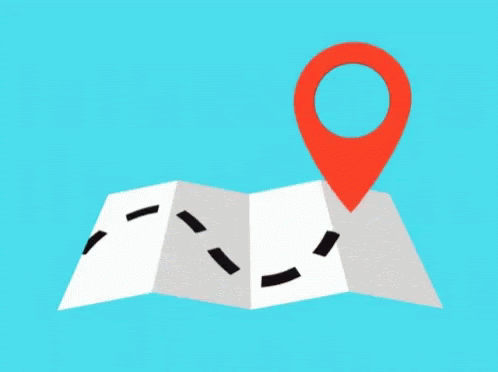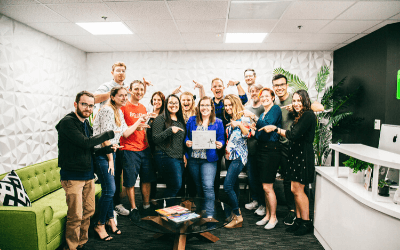Local SEO is one of the best ways to find quality leads and drive relevant traffic to your website. Local search engine optimization (SEO for short) is a more targeted approach to SEO. Local SEO focuses on users that are in your business’s area, not just across the internet. Local SEO isn’t just for retail businesses or restaurants, though. Business-to-business companies can also take advantage of local SEO to find qualified leads.
So what’s the best way for your business to start dominating online? Keep reading for our top 12 local SEO tips to help you start ranking consistently online.

Outrank Your Competition With These Local SEO Tips!
Google My Business
1. Claim Your Google My Business Listing
If you’re brand new to the world of local SEO, your Google My Business listing is one of the most important things to create and optimize. A Google My Business listing is like a virtual storefront on a search engine.
If you haven’t created a Google My Business listing for your business, claiming and then verifying your listing is a great place to start for local SEO. Once you have a listing, you also can work on getting to the top of Google’s local map pack, which is another “arm” of local SEO and local search marketing.
2. Optimize Your Listing With Accurate Information
Once you have a Google My Business listing, the next big step is to optimize it and make sure it has accurate information. A Google My Business listing has your business’s name, address and phone number on it (your NAP). If any of this information is incorrect, then you’re really missing out on local SEO and the Google map pack rankings.
If one part of your NAP is incorrect or inaccurate, then people can’t find your business. Even small details like your operating hours should also be accurate, but your NAP should be your first priority for accuracy. Conducting an audit of your NAP and making sure it’s accurate wherever your business is listed online can help in the long run for other local SEO efforts.
3. Post to Your Listing on a Consistent Basis
Once you’ve claimed, verified and optimized your listing, posting on a consistent basis will help your ongoing SEO efforts. A Google My Business post isn’t quite like a social media post, but it is something that can be updated to share offers, news and events when people find you through search. Posting on a regular basis shows users you’re active online, and adding a CTA to new blogs and landing pages can encourage organic traffic to your website, as well.
Pro Tip: Always be on the lookout for Google core update news!
Local Citations and Links
4. Build Relevant Local Citations
Local citations are references to your business’s NAP. Google My Business is one example of a local citation, but there are other platforms like Yelp and social media as well. Having a wide variety of local citations can build over time and positively impact your rankings. Google will see the accurate NAP information for your business, thus helping you rank better on search engines. This is one reason an NAP audit is so important!
5. Commit to Local Link Building on a Regular Basis
Link building, like collecting citations, is a way to become an authority for SEO purposes. If other trusted websites link to yours, Google sees it as a sign your website is credible. In turn, it can help you in local SEO rankings.
There are a few ways to collect backlinks. You can pursue sponsorships, local news outlet coverage and even create scholarships for your area. Once you’ve identified a few link-building opportunities, regularly building local backlinks to your website can help move the needle for your SEO efforts.
6. Start Using Social Media Platforms
Social media platforms are one source of local citations. If you don’t already have a page set up for your business of Facebook, Instagram, LinkedIn and Twitter, get them started! Having those profiles set up and filled out with accurate information on your NAP can help your local citations. Posting on a regular basis can also demonstrate that your business is active online.
Pro Tip: If your business sponsors events, you can use that to build links for prime local SEO real estate!
Your Website
7. Create Pages if You Have Multiple Locations
If you have multiple business locations, it helps to have pages on your website for them. A page for each location can be optimized for specific keywords, whereas a single page with all of your locations can’t be. With these individual pages and Google My Business listings for them, you can go even further in local SEO.
8. Optimize Your Website, Too
Your website is a huge component of your local SEO efforts. Having an optimized Google My Business listing is great, but having both your Google My Business and your website optimized is even better. You really can’t have one without the other in order to rank well.
If your website is optimized if it loads quickly, provides great user experience and the content is well-optimized for local keywords, then congratulations — you’re on your way to a top-ranking website. Having your website optimized will support your local SEO efforts on your Google My Business listing and with your backlinking or link building.
9. Check Your Domain Authority
Your domain authority is essentially a score on how well your site will rank on search engine results pages (SERPs). While domain authority isn’t necessarily a metric you can find in Google Analytics, you can use tools like Moz’s Domain Authority checker to find out what your score is.
Once you know your domain authority score, you can check it and track it on a regular basis. This is especially important if Google rolls out a major core update and you’re concerned about your rankings dropping.
Pro Tip: Site speed is everything. If your website takes more than five seconds to load, the chances a user will leave go up by 90%! (UX Planet)
Reputation Management
10. Monitor Your Online Reputation
Your online reputation is an aggregate of all your business’s reviews in the digital world. Google, Yelp, Facebook and industry-specific websites are all part of reputation management. Online tools like BirdEye or TrustPilot can also help with reputation management automation, alerting you whenever you receive a new review from a customer or user.
11. Collect Reviews from Happy Customers
If you have happy customers, it never hurts to ask for a review! Reviews from happy customers can show you’re a trusted authority and build a positive, reputable image for your business. Prioritize Google reviews first, but don’t neglect the other platforms for reviews, because there are plenty of places customers can submit them. Depending on your industry or field, you could want to focus on certain review websites over others.
Here are just a few popular review platforms that exist besides Google for both businesses and products:
- Yelp
- TripAdvisor
- Amazon
- Angie’s List
- G2 Crowd
- Better Business Bureau
While Google is a great place to start for reviews, it never hurts to cast a wide net and ask customers to submit reviews to industry-specific listing websites!
12. Respond to Reviews, Good and Bad
Reviews can really be a case of the good, the bad and the ugly. But you still should respond to them! Responding to reviews (even if they’re negative) shows that not only do you care about your customers’ experiences, you’re also committed to helping them after you’ve made a sale.
When responding to reviews, keep it personal. Copy/pasting the same reply is a dead giveaway, so addressing a customer’s concerns directly (politely, of course) is the best route to take. Being present and regularly keeping up with reviews is the best way to keep up your business’s positive reputation.

Local SEO: the Grind Never Stops
SEO, both general and local, is a grind that’s well worth committing to. You can think of it as one of the main “tent poles” that prop up your overall marketing strategy. If you don’t keep it up (and it “falls”) then your tent just lost one crucial leg of support.
It may not be easy at first, but dedicating time to improving your SEO right now is key to climbing the rankings on Google and the map pack. Just take it one step at a time. Understand that this can be overwhelming for some, so if you need assistance, find a partner with local SEO expertise to help out. It’s never a bad thing to ask for help from the experts!






